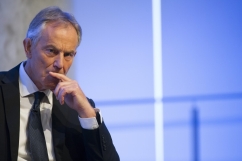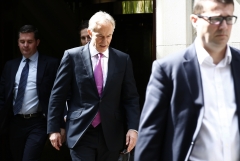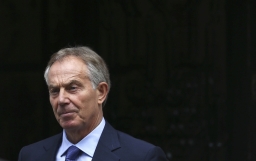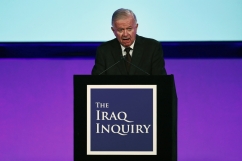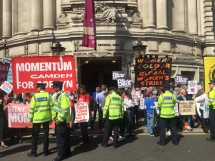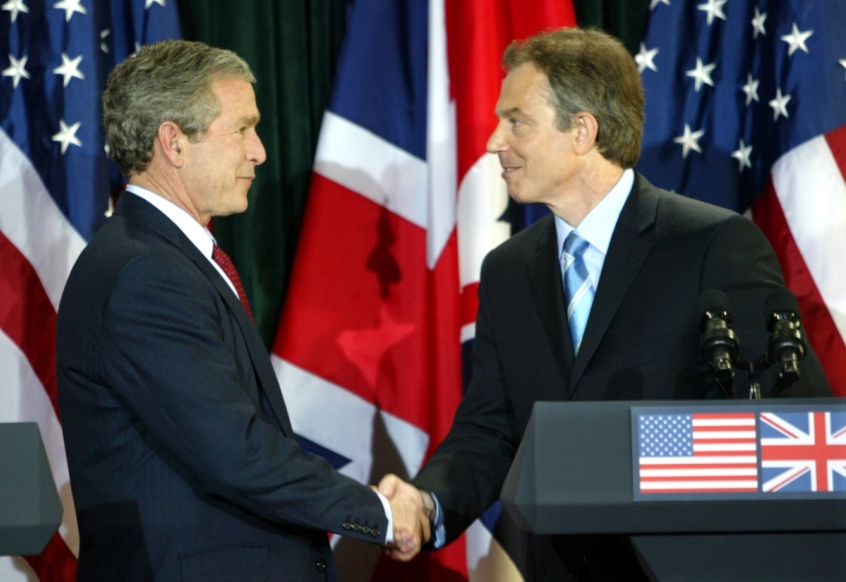
When the Hutton inquiry into the death of weapons inspector Dr David Kelly was published in January 2004, it was widely dismissed as a 'whitewash'.
The same cannot be said of the report launched today by Sir John Chilcot, who this morning said that Tony Blair signed up to the 2003 invasion before "peaceful options...had been exhausted" and that military action was "not a last resort".
Earlier this week, Christian Today speculated on why Blair joined forces with the US in authorising the Iraq war, emphasising that Blair took the decision early: "9/11 is the crucial context to the Iraq war because it is believed that Blair decided on that day to commit to doing whatever Washington wanted, effective handing British foreign policy to the US."
As it happens, I wondered whether the word "whatever" was unfair. Well, now we have it from the horse's mouth. The Chilcot report reveals a note written by Blair to President George W Bush some eight months before the war saying:
I will be with you, whatever.
Arguably, these are the most damning six words of the 2.6 million in the report.
There is an almost infinite amount to absorb, but here we will focus on Blair's communications with Bush freshly unveiled by the inquiry.
In the six-page memo marked 'secret and personal' written on July 28, 2002, Blair also warned Bush: "In Britain, right now I couldn't be sure of support from parliament, party, public or even some of the Cabinet".
This echoes the 'Manning memo' of 14 March 2002, already in the public domain. A full year before the invasion – and eleven months before Blair still claimed Saddam Hussein could avoid war – his foreign policy advisor David Manning wrote to Blair after dining with Condoleezza Rice, Bush's National Security Adviser: "We spent a long time at dinner on Iraq," he wrote. "It is clear that Bush is grateful for your support and has registered that you are getting flak. I said that you would not budge in your support for regime change but you had to manage a press, a Parliament and a public opinion that was very different than anything in the States."
A more surprising line in the newly revealed memo comes when Blair does what we knew Bush, Bush's Secretary of Defence Donald Rumsfeld and Vice President Dick Cheney had been doing since 9/11: playing up the false link between Al Qaida and Saddam's Iraq. "If we recapitulate all the WMD evidence; add his attempt to secure nuclear capability; and, as seems possible, add on al-Qaida link, it will be hugely persuasive over here. Plus, of course, the abhorrent nature of the regime".
Sir John Chilcot's report is broken down into different stages and in it, 9/11 is clearly the turning point. The day after, on 12 September, Blair wrote to Bush calling for tough action which, he says, "some will baulk at".
Blair: "There will be many who ask: what is the next stage of this evil?...What of [the terrorists'] capacity to get hold of WMD? We know there are countries and individuals trading in WMD. We need a range of sanctions and pressures to stop this...Some of this will require action that some will baulk at...But we are better to act now... than let the day be put off until some further, perhaps even worse catastrophe occurs. I believe this is a real possibility."
And although Blair apparently made some attempts to delay a confrontation with Saddam in the immediate aftermath of 9/11, it is clear from the notes revealed in Chilcot that he was onside, saying, "No doubt we need to deal with Saddam".
On October 11 2001, four days after the first strikes on Afghanistan, Blair writes: "No doubt we need to deal with Saddam...But if we hit Iraq now, we could lose the Arab world, Russia, probably half the EU... I am sure we can devise a strategy for Saddam deliverable at a later date."
Also revealing is a phone call between Blair and Bush on 3 December, 2001 about "how the next phase might proceed". He emphasised that "contrary to press reporting" he was not opposed to removing Saddam. "It would be excellent to get rid of Saddam," he said, but "there [needs] to be a clever strategy for doing this... An extremely clever plan would be required."
The following day [4 December 2001], Blair wrote a note to Bush entitled, 'The War on Terrorism: The Second Phase'. Despite later suggesting they "add on the al-Qaida link" to the sense of a threat from Saddam, he acknowledges in this memo that Saddam's threat has "tenuous" links to 9/11. Therefore, he suggests "softening up" public opinion and calling for a "strategy for regime change that builds over time... until we get to a point where military action could be taken if necessary."
The report says that Manning then delivers the note in person and reports back that Bush is "open to Mr Blair's ideas".
In Blair's July 2002 memo which says "I will be with you whatever", Blair makes it clear that he is onside with war within months. "A strike date could be Jan/Feb next year. But the crucial issue is not when but how."
On January 30, Blair writes a personal note to Bush entitled "Countdown," making it clear that Blair knew was is coming, a month before he said publicly that Saddam could still stay in power.
Finally, a worried Blair writes to Bush after the invasion on 5 October 2003: "By this time next year it better be going right, not wrong. For us and for the world!"
According to Chilcot, who can be praised for today producing the opposite of a whitewash, "it" went very wrong indeed, for Blair, and for the world.










